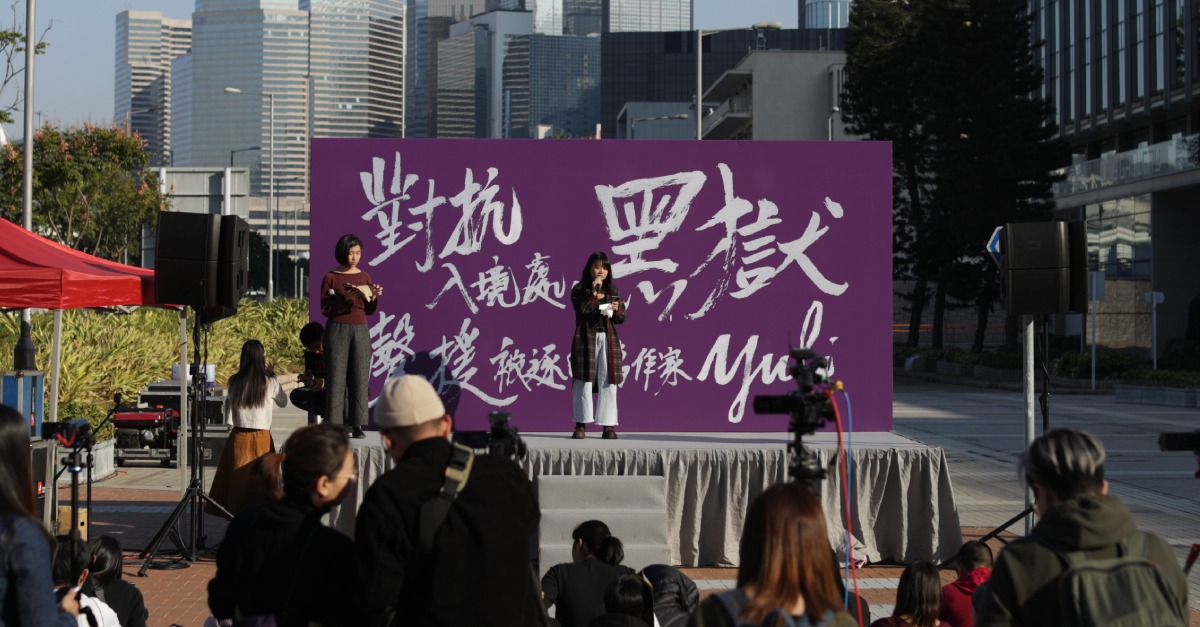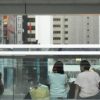Original: 【Yuli:「請支援我所有朋友!」被逐印傭作家惦掛香港及羈留所被囚人士】
Translators: yehua, P, MH, Jeff, LWH
If you would like to be involved in our translation work, please get in touch here.
Last Saturday (December 7), a support group for the deported Indonesian journalist Yuli Riswati held a rally at Edinburgh Place to demand that the Immigration Department address why it had deported the innocent Yuli, improve the awful conditions in immigration detention centers, end the suppression of all protesters, and to respect domestic workers’ civil liberties. The organizer estimated that around 700 people attended the rally, including those who came and left.
Yuli worked in Hong Kong as a domestic worker for 10 years and is a prolific writer and photographer. She has been documenting the anti-extradition bill movement in order to inform her fellow Indonesians about the protests and combat the biased and incorrect information published by the press and the Indonesian Consulate. At the end of September, the Immigration Department (ImmD) arrested her on the basis of an unrenewed work visa. Even though the charge was later withdrawn, the Department detained her for 28 days on the pretext that she did not know anyone in Hong Kong and had nowhere to stay, ignoring her employer’s offer to continue to employ Yuli and provide residence for her. Yuli suffered abuse at Castle Peak Bay Immigration Center (CIC), and was then pressured to cancel her application for visa renewal and agree to leave Hong Kong. She was deported on December 2.
The revelation of the Immigration Department’s unfair treatment and atrocious abuse of Yuli created a short stir of awareness, and some mainstream media outlets also reported on the case. On the day of the rally, many who previously did not know much about the situation of migrant domestic workers came to understand their plight; some even brought banners in support.
Although Yuli was unable to participate in the rally, the support group was able to contact her by phone. Yuli thanked them for their support, and also urged people to direct their attention towards the broader system of immigration control. Below is Yuli’s full statement; the text has been edited for organization and clarity.
Yuli Riswati’s statement
“Hello everyone, I am currently seeing doctors, taking medicine, but I am much better than I was, because lots of people have been supporting me. Thank you Hongkongers; thank you, my friends; thank you, all of you.
I really want to thank you all for supporting me, but I hope that you will not only support me, but also all of my friends. Because I want to say, this is not just for me, I still have many friends in Hong Kong; I am not the only one who faces abuse. For example, when I was at CIC, I saw many Filipinx friends, Pakistani friends, and an Indonesian friend—all of them are suffering. And so I hope that if you really want to help, please do not only help me, but help everyone in immigration detention.
In reality, I am actually very lucky; I have good friends, lots of people support me. But other people may not be so lucky. Because as I experienced, not many people visit people in CIC. I have never gone to prison, I have never been to Lo Wu [Prison] or Dai Lan [Prison], but I found it so difficult in CIC. I asked others: ‘How are you doing? Is it also difficult in Dai Lan [Prison] and Lo Wu [Prison]?’ They said: ‘Actually, no; this place is much worse. I was there for 10 years; one month in CIC is worse than 10 years there.’
And so I hope that if you really want to help, please do not only help me, but help everyone in immigration detention.
They told me that in Dai Lan and Lo Wu … they had hope, they knew how many days they had been in prison, and could also count the days they would get out. But in CIC, you don’t know when you will get out, when you can leave. In Dai Lan and Lo Wu, you sleep better, eat better, people treat you better. You have access to hot water while showering, people wash your clothes; at least you have things to do, you can buy things to eat. But in CIC, it is so different; those detained have a worse time than they would in prison. Every day, you are scolded, as if you are in prison; but we are not real criminals, we have not killed anyone, or done anything like that. Actually, if anyone had committed a crime, they would have been deported a long time ago. The people there are simply waiting for their visa, waiting to return to their country, waiting for a temporary ID. Why must they suffer in detention—where they are treated as less than human?
The first day I entered CIC, it scared me to death. They did a body search, which should not require stripping. But then, inside, I had to take off all my clothes, and be naked. What? Why do I have to do this? I didn’t do anything wrong, I didn’t do anything bad; why did I have to go through this, why did they have to scare me like this? The same thing happened the next day: they told me to see a doctor, to check if I had any tattoos; they asked me to take off my clothes, but the doctor was not a woman, he was a man. But as you know, Muslim women like myself cannot let men see our bodies.
In my first two weeks in CIC, I think I developed depression. I didn’t know what I was doing … I don’t remember … those two weeks … because I was so angry … I didn’t know what to do, how to keep living. By the time I came to my senses, I had already spent three weeks in CIC, at which point I started to talk to other detainees, who said they felt a similar feeling. Many people felt: Why must we suffer like this here? I have never been to prison, but even today, I still cannot forget how painful it was to be in there …
So add oil, Hongkongers—add oil! Thank you, everyone!”
When recalling her experiences in detention, Yuli choked up and cried. The participants in the rally applauded and shouted words of encouragement.
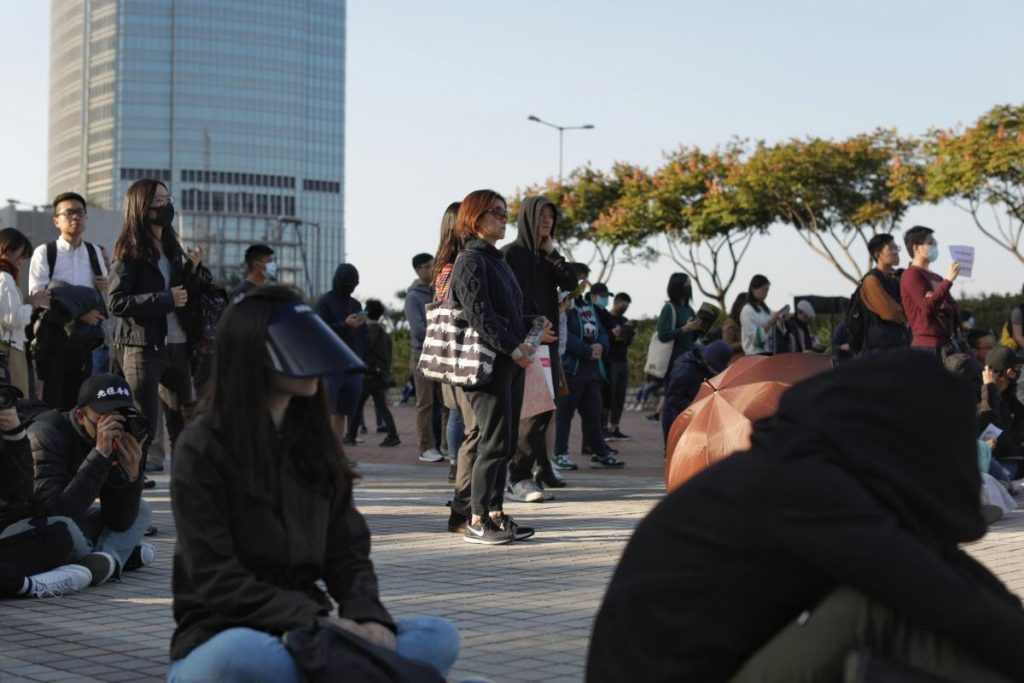
Since Erwiana’s case came to light, violence towards migrant domestic workers has continued and remains ubiquitous
Yuli’s 28 days in arbitrary detention and her repression by the Immigration Department highlights how—hidden behind Hong Kong’s image as a civilized city—violence towards domestic workers exists in a myriad of ways.
In 2014, Indonesian migrant domestic worker Erwiana was subjected to long-term physical abuse by her employer and their two daughters. After being worked to exhaustion and deprived of sleep and food, she lost her ability to work, which resulted in her being deported back to Indonesia. This led to a rally attended by 5,000 people; in the end, Erwiana’s employer was sentenced to six years in prison, though she was granted early release in the summer of 2018. In the same year, Kartika—another domestic worker from Indonesia—was beaten by her employer with shoes, metal clothes hangers, and bike chains. This assault left more than 45 scars on her body.
Hidden behind Hong Kong’s image as a civilized city—violence towards domestic workers exists in a myriad of ways.
In 2015, Elis Kurniasih, an Indonesian domestic worker, was staying at an outdoor terrace of her employment agency’s (Sunlight Employment Agency) overcrowded dormitory while she was in the middle of changing employers, when a 200-pound concrete canopy crashed down onto her. Forcing migrant workers to stay in designated locations is common practice by employment agencies to prevent them from signing with a different agency. The crash caused multiple injuries and organ damage, and eventually killed Elis.
This time, it was the Immigration Department’s turn to abuse migrant domestic workers. While in detention, Yuli suffered from humiliation and had to live in squalid conditions, resulting in physical deterioration and psychological depression. Nicole, the secretary-general of the Hong Kong Federation of Asian Domestic Workers Unions (FADWU), spoke on stage about how the department’s approach to Yuli’s case defied its standard practices, and sought specifically to target Yuli’s participation in the anti-extradition bill movement: “Unions handle cases of visa renewal for migrant domestic workers all the time, but ImmD’s treatment of Yuli was highly unusual. Yuli’s employer had already indicated that they were willing to keep hiring her, but ImmD refused to approve her application for renewal, and then detained her in CIC without any reasonable justification.”
Speaking in Bahasa Indonesia, Yuli’s friend Mary said that she had interacted with many migrant domestic workers who overstayed their visas, and that she even knew of people who forgot to renew their visas for more than a year. But as long as their employers were willing to keep hiring them, they simply had to inform ImmD in writing and the situation would be resolved. The Hong Kong government and ImmD must be held to account over their treatment of Yuli in this case.
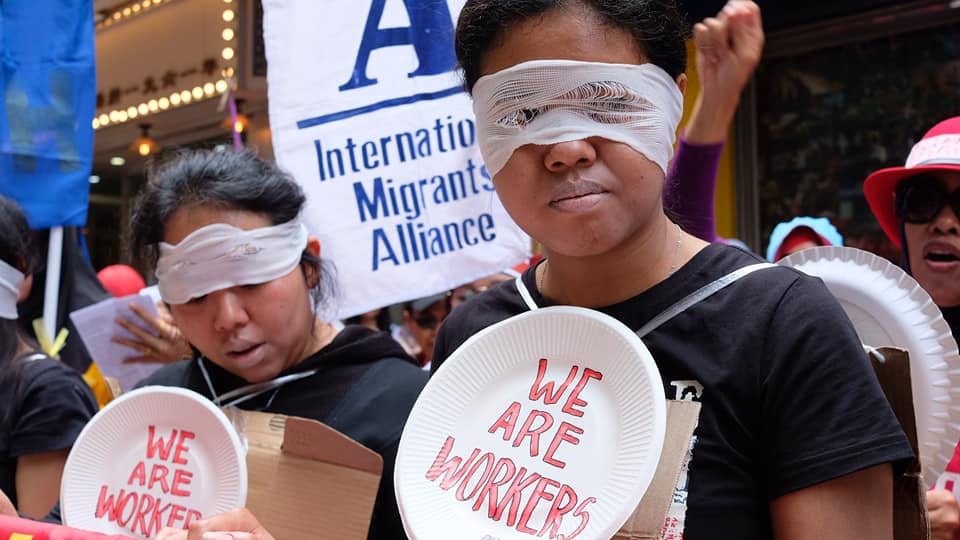
Introducing the political and economic background of migrant domestic labour: What makes resistance so difficult?
The British Hong Kong government began to introduce domestic workers from the Philippines in the 70s. Their numbers were small at first, as they were mostly hired by upper-middle-class families to do housework and take care of children. In the 80s, Hong Kong’s economy underwent restructuring. Light industries like textiles, garment, and electronics moved to Mainland China, and Hong Kong quickly developed its trade and finance sectors, increasing the demand for skilled labour; as local women became engaged in long-term employment, the government needed to plug the gap in domestic labour. It started to introduce Indonesian migrant workers in the 90s. In 1993, 6,000 migrant workers were brought in. This figure rose to 100,000 in 2006. As of March 2019, there are around 390,000 migrant domestic workers in Hong Kong, accounting for 10% of the city’s working population.
Migrant domestic workers are not covered by Hong Kong’s minimum wage legislation (the “minimum allowable wage” to which they are legally entitled is 4360 HKD per month), a policy the government sought to justify via comparing the levels of development between Hong Kong and migrant workers’ home countries. The government sees them solely as a source of labour, and uses various administrative means to prevent them from participating and integrating in society. As Yuli’s support group wrote: “Migrant domestic workers are prohibited from doing any paid or unpaid work not listed in their employment contracts. This means if ImmD wanted to punish a worker, even if a worker is doing unpaid volunteer work, she could be prosecuted for violating her conditions of stay.” The group added that “migrant domestic workers must leave Hong Kong within two weeks of their contract ending if they fail to find a new employer. In contrast, other migrant workers—such as professors and professionals—do not face such restrictions.” Migrant domestic workers also are not eligible to even apply for the right of abode, no matter how long they have worked in Hong Kong.
Migrant domestic workers come from underdeveloped countries, whose economies are reliant on their remittances. Their working conditions border on indentured labour, as they often have to incur a debt in order to pay their employment agencies an agency fee—where overcharging is ubiquitous—so as to work in Hong Kong. They usually cannot afford to send any money home until they have finished repaying their debt. When the government uses the aforementioned laws to threaten them with deportation, one can imagine the risk that ordinary migrant domestic workers would be taking by participating in social movements. “Right now, domestic workers are more afraid of the Immigration Department than the police,” said Siu Yuk, a FADWU representative. “Given how Yuli’s case was dealt with, what does this mean for workers participating in May Day and July 1 protests? Would each of us also have to march in a mask?” Yuli has demonstrated admirable courage in staying committed to her journalism despite these restrictions.
As of March 2019, there are around 390,000 migrant domestic workers in Hong Kong, accounting for 10% of the city’s working population.
Many participants in the rally did not know much about the situation of migrant domestic workers. The three participants interviewed by Worker News only found out about the assembly from the “Hongkongers’ Schedule” [a regularly circulated schedule of all protests and related events taking place in a given week]. They only began to understand the nuts and bolts of the situation once they arrived and read the flyer. Despite being unfamiliar with the circumstances facing migrant domestic workers in Hong Kong, they all shared their personal experiences.
Ms. Wong, a hairdresser in Central, spoke about her father’s experience: “My father worked in a restaurant in the UK for around 10 years in the 80s. He crossed an ocean to find employment because he believed it would be more lucrative to work there. He paid taxes there, so continues to receive a pension now that he’s back in Hong Kong.” Reflecting on her father’s circumstances, Ms. Wong finds it similar to Yuli’s experience of having to migrate to Hong Kong to find work. Based on her father’s experience, she believes that migrant workers’ welfare should be improved. But regarding whether they should have the right to apply for right of abode, Ms. Wong is more conflicted, as she believes complete equality is difficult to realise.
Pearl, who lives in Toronto but has returned to Hong Kong recently to support the anti-extradition movement, attended the rally by chance. She wanted to express her support of Yuli after learning about her situation. She mentioned that Canada also excludes outsiders in a similar way: “There’s a saying among Chinese social circles in Toronto that certain companies will refuse to interview you if they so much as see a Chinese surname on your resume. However, since we cannot change how others think, we can only push ourselves to perform better at work.”
Migrant domestic workers are also not eligible to even apply for the right of abode, no matter how long they have worked in Hong Kong.
Mr. Fok, who works as a ground handler at the airport, pointed out that since migrant workers have to decide to leave their home to work elsewhere, and contribute to another place’s economy, they should be given equal rights: “Their employment and living arrangements should be allowed some flexibility, for example, by changing the enforced ‘live-in policy’.” He also mentioned that he knew about how South Asians have difficulty applying for passports from watching the programme Hong Kong Connection: Identity Unknown. The programme describes how the government advocates for racial diversity on a superficial level, yet uses screening methods to intentionally obstruct South Asians who are applying for passports in a process that lacks transparency. He suspects that the Immigration Department keeps a blacklist, and that Yuli was specifically targeted in this case.
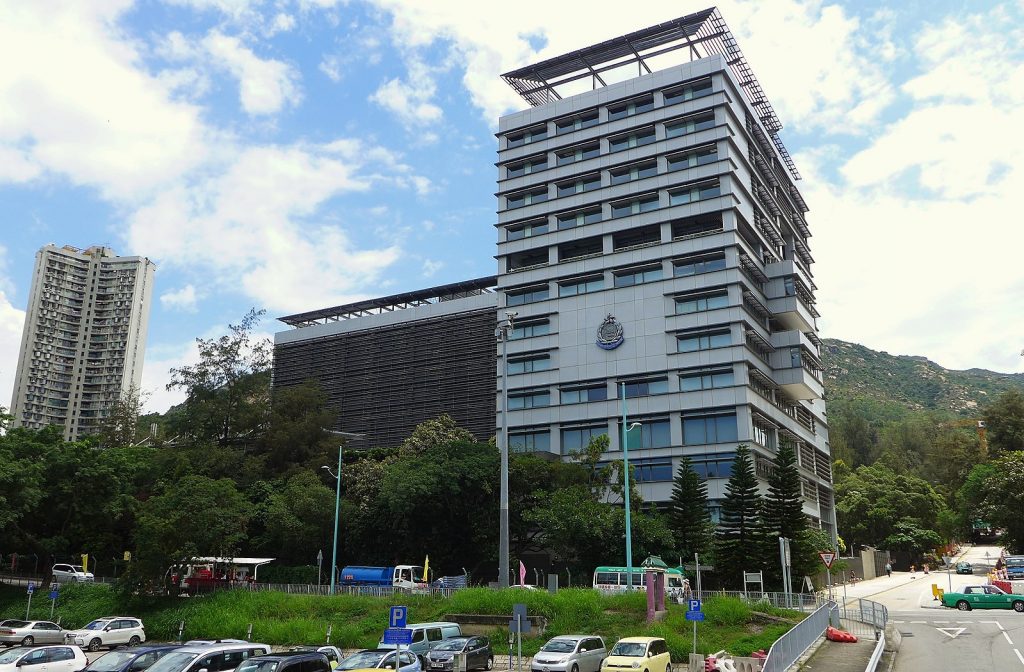
Prosperity Horizons under CC BY-SA 4.0 license.
The CIC has long been notorious among the refugee community
It is not the first time that the CIC, run by the Immigration Department against which the rally was protesting, has been exposed for its problematic practices.
In 2012, the Immigration Department told media outlets that the CIC employed 100 disciplinary officers with anti-riot training. The center had four pepperball guns that can be equipped with a dye. Since the Immigration Department assumed control over the center in 2010, there have been six attacks that resulted in a total of eight casualties, including immigration officers and outsourced medics who mostly suffered minor injuries such as abrasions and bruises.
In 2016, around 50 detainees initiated a riot, demanding the immigration center to allow them to “walk the streets.” They refused to return to their cells or eat, and the immigration officers used pepper spray to discipline the detainees and locked the rest area. Mainstream media labeled this riot as a “Fake Refugees’ Rebellion.”
The psychological abuse and torture there come from not knowing why you got in, when you can leave, whether you can seek legal help from the outside.
In 2017, a refugee told the press that he had suffered from political persecution and came to Hong Kong to seek asylum but was rejected by the Immigration Department. Because he refused to be deported, he was beaten by officers, kicked in the genitals, waterboarded, slapped and pinched by the ears, and then illegally detained for almost five months.
Anna, who knows a refugee family in Hong Kong and thus has learned about CIC, said: “The psychological abuse and torture there come from not knowing why you got in, when you can leave, whether you can seek legal help from the outside, who you can direct your complaints to …. You know nothing. Hongkongers can be released from the police station after 48 hours, and one roughly knows the crime they charge you with. But detainees at CIC know nothing. So even being there for a week will make you crazy. Because your detention period can range from a few days, a few months, to a year and more.”
“CIC is a detention centre for adults who have allegedly violated the Immigration Ordinance and are waiting to be deported. In 2010, the responsibility of managing CIC transferred from the Correctional Services to the Immigration Department. According to informants, the Immigration Department does not know how to run a place that functions as a jail,” she continued.
Anna talked about a couple she knows from Egypt whose refugee status is recognized by the UN, yet were detained for 10 months upon coming to Hong Kong to seek asylum. “The husband was blind in one eye, while the wife had a back injury and an early-stage miscarriage,” she said. “They had sufficient reason to not be detained on the basis of having a disability and being a married couple. But because they were tricked into signing papers that said they agreed to the detention, they staged four hunger strikes over the course of the detention period. The wife was sexually abused by other detainees, and her husband had to bang his head against the cell bars to get officers’ attention, and ask them to investigate his wife’s situation.”
“Under ‘One Country, Two Systems,’ China is regulated by the Convention Relating to the Status of Refugees while Hong Kong is not. Here we deal with alleged refugees by referring to them as ‘Torture Claimants.’ The success rate of such claims is less than 1%—there have been over 20,000 cases in the past 10 years, while only 160 cases have been successful. In contrast, the success rate is roughly 40% in Canada.” The harsh treatment of refugees by the Hong Kong government and the oppression and marginalisation that migrant domestic workers face in the city prompted Anna to question the movement’s approach to international solidarity: “The kind of international connection with Britain and the US that we keep talking about has been confined to connection with their top leadership, say, Trump and Boris Johnson. What about our relationship with the Indonesian and Filipinx people? They live in our homes, but we never think about connecting with them! This feels extremely absurd. What is the ‘going global’ that we talk about?”
“Indonesia and the Philippines only overturned dictatorships in the 80s and 90s, and are still not completely democratic even though they have the right to vote. Just now I mentioned how their consulates in Hong Kong keep repressing migrant workers’ participation in civil society. Last September, there was a nationwide anti-corruption and anti-government student movement in Indonesia, and its slogan ‘Reformasi’ appeared as graffiti on a street here in Hong Kong. Why do we not treasure and try to connect with these people, who have firsthand experience on authoritarian dictatorships?” Anna asked the rally from the stage.
Transcending divisive national borders and rediscovering Hong Kong’s relationship with other peoples
The incongruities between nationality and nation often become a strategy for the ruling class to divide its people. Villagers from Gangjeong Village, Jeju, sent the rally an open letter sharing their experience opposing the US military’s construction of a naval base there. In the letter, they describe how the South Korean government toes the US’ line, deporting protesters from other countries who came to demonstrate against the US naval base. Below is an excerpt from the letter:
“Facing fierce resistance from the public, the nation has blamed losses incurred from the construction delays on the protestors. The navy once even demanded that the protestors pay 3.45 billion KPW [3.83 million USD] as indemnity. This government’s oppression affects not only its own citizens but also supporters from other countries. Two people were forcibly deported while over 21 people were denied entry over 24 times. (They attempted to re-enter but were rejected again.) Those who expressed support for or participated in the Gangjeong protesters that came from abroad, which included members of the clergy, were all subject to the Korea Immigration Service’s interrogation and threatened that they would be denied visa renewals if they participated in protests again.
Why do we not treasure and try to connect with these people, who have firsthand experience on authoritarian dictatorships?
Anna
“International residents who live in Gangjeong Village and participated in protests once were denied entry at the airport after returning from overseas travel, even though their visas had not yet expired. After being held at the airport for a few days, they were then forcibly deported back ‘home.’ One can assume that they were denied entry due to their participation in the Gangjeong protests, but despite asking repeatedly at the time why they were denied entry, they were never given a clear reason. They were only given a ‘Notice of Denied Entry,’ which read: ‘According to the stipulations of Immigration clauses 11 and 12, you will be deported.'”
The economic growth of developed countries is built on the labor and commodity exchanges of underdeveloped countries in this giant, globalised economy. The disparities between different nationalities, languages, and cultural customs make it even more difficult for exploited and oppressed communities to unite with one another. Given the intersecting oppressions that Yuli faces, a rally in her honour that allowed people from different places to come together and bond over shared struggles is a precious solidarity-building opportunity.
It is especially important for Hongkongers to understand how our lives are intertwined with people from other regions, given how our city relies and depends on international exchange on a daily basis. We hope the political persecution Yuli faced can create an opening for us to challenge the dehumanising practices of the Immigration Department, and for the Hong Kong working class to understand its relationship with people from other places, from Mainland China, Asia, and the rest of the world.

